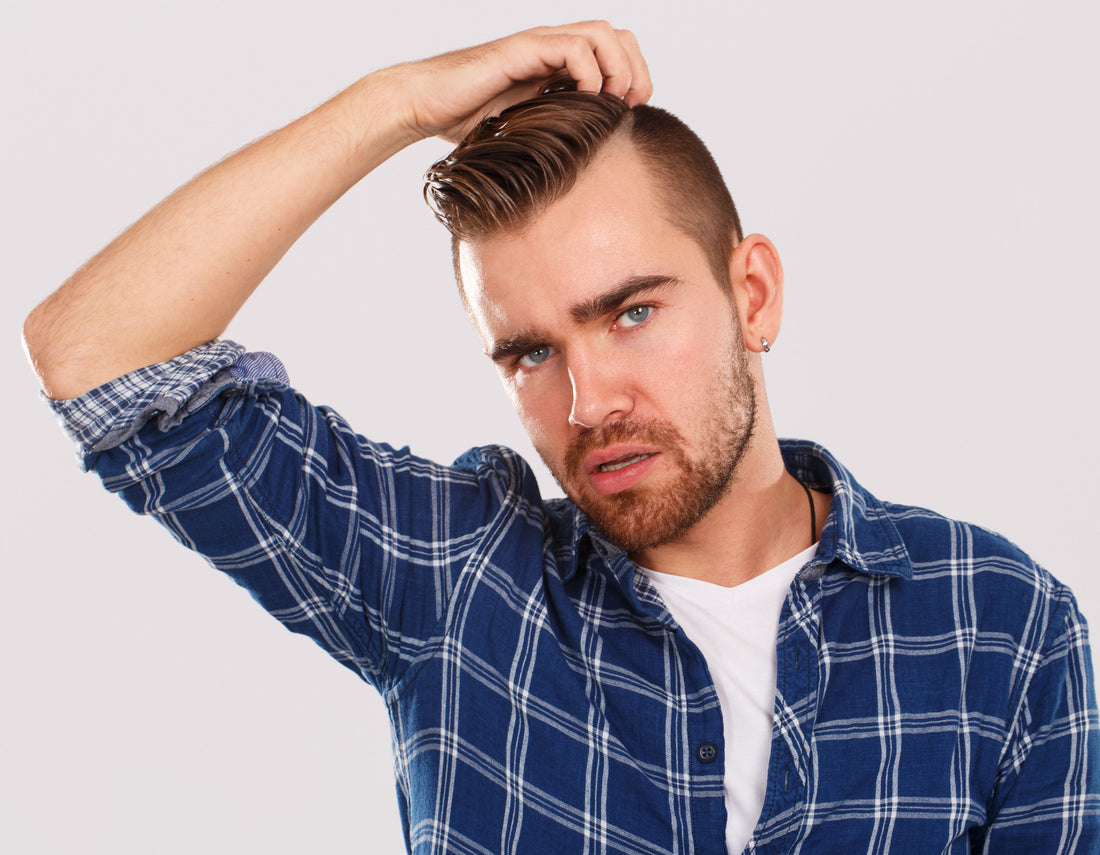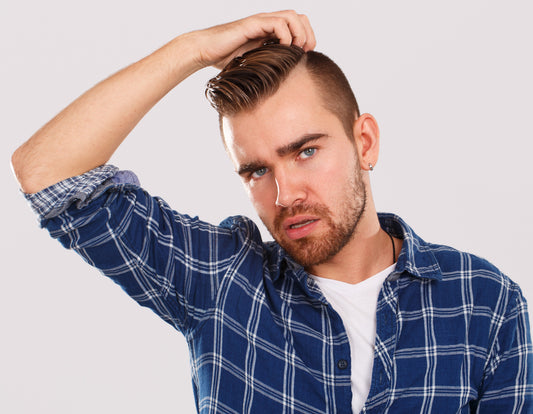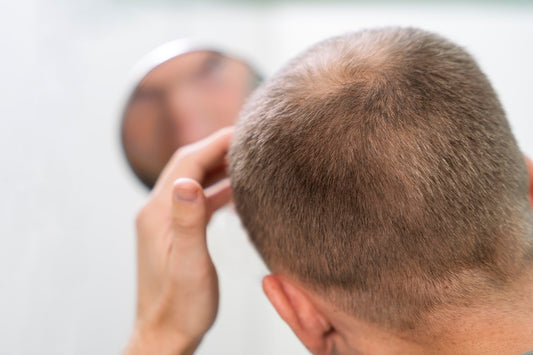Let’s face it: No one wants thinning hair. Whether you work as a model or as a backend IT support person, you value the confidence you get from a full head of hair. Ideally, we’d want to keep our luscious locks looking young and full for as long as we want.
Unfortunately, reality can be disappointing.
According to the Cleveland Clinic, about 25% of people assigned male at birth see the first signs of thinning hair before age 21. This percentage only increases as we age and is widely accepted as a natural phenomenon linked to aging.
So, does this mean there’s no hope against thinning hair?
Don’t Lose Hope
Not all hair thinning is irreversible. If you’re experiencing hair thinning and don’t know how to deal with it, then this article is for you. Below you’ll find the different causes for thinning hair as well as the steps you can take to alleviate them.
Before moving on, remember to seek the help of a healthcare professional or a dermatologist before trying to solve any hair-thinning issues you might be facing.
1. Find the Cause
With every problem, there is a solution – and a cause. If you look in the mirror and find your hairline receding or your hair looking patchy, the first question you have to ask is “Why?” Various factors can cause thinning hair, each one requiring a different solution.

Your thinning hair can be caused by factors such as genetics, hormonal changes, nutritional deficiencies, stress, underlying health conditions, or a combination of any of these. Understanding the root cause can help you address the issue more effectively.
2. Healthy Diet = Healthy Hair
If you’re eating nothing but highly processed food several times a week and wonder why your hair isn’t looking as full and vibrant as before, you should probably check on your diet.
In one study by Emily L. Guo and Rajani Katta, it was found that nutritional deficiency can impact both hair structure and hair growth. Maintaining a poor diet may cause hair problems such as telogen effluvium (TE), androgenetic alopecia (AGA), female pattern hair loss (FPHL), and alopecia areata (AA).
Telogen effluvium (TE) is the excessive and rapid shedding of resting or telogen hair. Also known as club hair due to the shape of the root, TE is characterized by hair loss on the scalp which can affect as much as 50% of hair.
Androgenetic alopecia (AGA) is a genetically predetermined disorder due to an excessive response to androgens. This condition affects up to 50 percent of males and females and is characterized by progressive loss of terminal hair of the scalp any time after puberty. [1]
Female pattern baldness (FPHL) is the most common type of hair loss in women and is caused by hormones, aging, and genetics. Female-pattern baldness is characterized by an overall thinning of scalp hair while maintaining the normal hairline. [2]
Alopecia areata (AA) is a disease caused by the immune system attacking hair follicles, thereby causing it to thin out. While you can lose hair from any part of your body, AA usually affects the head and face. [3]
If your doctor determines you have a nutrient deficiency, you want to include a variety of nutrients in your diet. This includes vitamins, minerals, and proteins that promote hair health. As was mentioned in the study by Emily L. Guo and Rajani Katta, foods rich in biotin, vitamin E, iron, and omega-3 fatty acids can also be beneficial.
3. Don’t Overstress Yourself
Let’s face it:
Seeing your hairline receding or patches of your scalp gradually becoming more visible can take the wind out of anyone’s sails. Each time you pass by a reflective surface, you can’t help but glance – and worry – about your thinning hair. Every time it crosses your mind, you feel more stressed – and that’s a bad thing.
You may already know chronic stress is bad for your health, but did you know it’s also bad for your hair?
According to Mayo Clinic, stress can affect hair growth and thickness in three ways: telogen effluvium (TE), trichotillomania, and alopecia areata (AA).
In TE, substantial stress pushes many hair follicles into a resting phase. Just a few months of this, and you’ll be surprised to find your hair simply falling out every time you comb or wash it.
Have you ever been so stressed that you start scratching or pulling out your hair? This is called Trichotillomania, which is the irresistible urge to pull out hair from your scalp, eyebrows, or other areas of your body. Trichotillomania often results from overwhelming negative or uncomfortable feelings, such as stress, tension, loneliness, boredom, or frustration.
As discussed earlier, AA is where your immune system attacks your hair follicles. This can be caused by several factors, which include chronic stress.
Thankfully, thinning hair brought about by chronic stress isn’t permanent as long as you find a way to alleviate your stress. There are many ways to do this, including yoga, meditation, light exercise, and sports.
4. Be Gentle on Your Hair
One piece of hair advice we often hear is avoiding harsh ingredients – and for good reason. For example, harsh ingredients like polyethylene glycols (PEG) can make your scalp feel itchy or burning. Another example is alcohol, which can lead to dryness as well as hair breaking and splitting. [4]
Being harsh on your hair isn’t limited to the chemicals in your hair care products, though. According to the American Academy of Dermatology Association, tight hairstyles such as braids, cornrows, dreadlocks, and hair extensions can cause traction alopecia.

Do your hair a favor and opt for gentler natural alternatives for hair care products. Also, change your hairstyle occasionally or give your hair and scalp a break from your usual tight style.
5. Take Care of Your Scalp Too
When discussing the health of your hair, it’s essential to keep in mind your scalp's health.
As you know:
Our scalp is what makes up the area of skin covering our head. It’s where our hair follicles grow out of, which means it’s just as essential to keeping a full head of hair as our luscious locks.
Like any other organ, our scalp needs the proper nutrients to retain vitality. This is because the right nutrients (like Vitamins A, C, and E) contain free-radical-fighting antioxidants. According to one study by Ahmet Akar et. al., the scalps of people suffering from alopecia areata had an abundance of harmful free radicals despite the body’s attempts at combating them.
Antioxidants fight the free radicals [5] that may eventually lead to varying degrees of hair loss.
Apart from antioxidants, you may also want to cleanse your scalp with a gentle exfoliating natural shampoo together. You can also pair this with a routine scalp massage to stimulate blood flow. [6]
6. Get the Right Supplements
As previously mentioned, providing our hair and scalp with the proper nutrients can help prevent different types of hair thinning. Unfortunately, we don’t all have the luxury of having nutritionists and/or a full-time service crew at our beck and call. So, how can we ensure we give our hair and scalp the nutrients they need to stay healthy and youthful?
The answer: Supplementation.
With hundreds of supplements on the market, how do you find the best one for you?
You may need to consult your physician or nutritionist to answer this question. They will help determine which macro and micronutrients you’re deficient in and how much you’ll need.
When selecting your hair supplement, we recommend opting for one with natural ingredients. Natural ingredients are safe, nourish your hair and scalp, and are better for the environment overall. If you’d like to know more about natural ingredients, you can read our article here.
The best hair supplement shouldn’t just come with natural ingredients but specifically natural ones proven by science-backed research.
For example:
Mohebi Life for Men comes with two scientifically proven hair-revitalizing ingredients in the form of pumpkin seed oil and saw palmetto extract. The pumpkin seed oil has been shown to help hair grow better [7] but also helped grow more during a randomized, double-blind, placebo-controlled study by Young Hye Cho et. al.

One study by Pilar Pais, Agustí Villar, and Santiago Rull found that saw palmetto extract may help prevent hair thinning by inhibiting the activity of 5-alpha reductase while reducing the uptake of DHT into hair follicles. 5-alpha reductase is an enzyme that converts testosterone into DHT which causes, among others, hair thinning in men.
Mohebi Life for Men not only contains both pumpkin seed oil and saw palmetto extract but also comes packed with other hair-boosting natural ingredients such as biotin, zinc, Vitamin D3, and chelated iron to help you repair your hairline, rejuvenate your scalp, and improve hair quality and growth.
In Conclusion
Thinning hair can have various causes. Once you find the cause, you can start changing your diet, hairstyle, lifestyle, and hair care routine to reverse the process slowly. When experiencing thinning hair, it’s important not to lose hope. Remember to always seek professional guidance before making any drastic changes to the above factors.
— — —
[1] Androgenetic Alopecia. Chin H. Ho; Tanuj Sood; Patrick M. Zito.
[2] Female pattern baldness. https://www.mountsinai.org/health-library/diseases-conditions/female-pattern-baldness#:~:text=Female%20pattern%20baldness%20is%20the,which%20maintains%20the%20normal%20hairline.
[3] Alopecia Areata. https://www.niams.nih.gov/health-topics/alopecia-areata#:~:text=Alopecia%20areata%20is%20a%20disease,affects%20the%20head%20and%20face.
[4] Is alcohol bad for hair? https://www.pantene.co.uk/en-gb/hair-tips/hair-care/is-alcohol-bad-for-hair/
[5] Free radicals, antioxidants and functional foods: Impact on human health. V. Lobo, A. Patil, A. Phatak, and N. Chandra. Pharmacogn Rev. 2010 Jul-Dec; 4(8): 118–126. doi: 10.4103/0973-7847.70902. PMCID: PMC3249911. PMID: 22228951
[6] Oxidative stress and alopecia areata. Yi-qian Ma Zhan Sun Yu-Mei Li Hui Xu. Front. Med., 15 June 2023. Sec. Dermatology. Volume 10 - 2023 | https://doi.org/10.3389/fmed.2023.1181572
[7] Beneficial effects of pumpkin seed oil as a topical hair growth promoting agent in a mice model. Valiollah Hajhashemi, Parvin Rajabi, and Mahdieh Mardani. Avicenna J Phytomed. 2019 Nov-Dec; 9(6): 499–504. doi: 10.22038/AJP.2019.13463. PMCID: PMC6823528. PMID: 31763209



